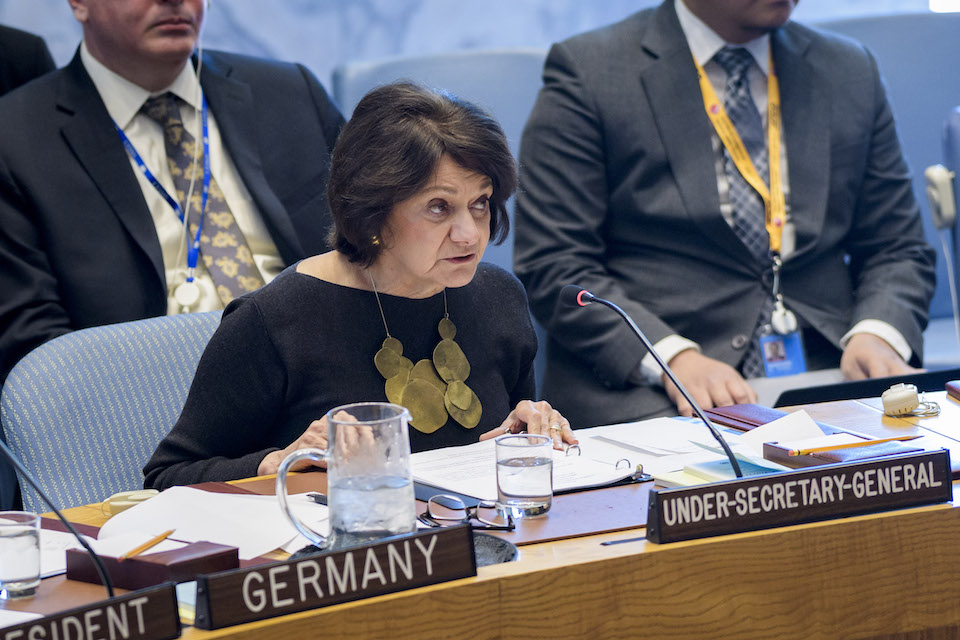At this holy time of year, we urge the new mandates to pursue a lasting legacy of peace.
Statement by Ambassador Karen Pierce, UK Permanent Representative to the UN, at the Security Council Open Debate on the situation in the Middle East.

Thank you Mr President. And let me start by congratulating Prime Minister Netanyahu on being asked to form a new Israeli Government and Prime Minister Shtayyeh on the formation of the new Palestinian Authority Government. The United Kingdom looks forward to working with both of your administrations to advance the objectives of peace and prosperity. Thank you also to our civil society briefers.
Mr President, as with other governments, the United Kingdom continues to encourage a just resolution to the Israeli-Palestinian conflict, in line with international law and relevant UN Security Council resolutions. Our understanding, this is shared by most Council Members, continues to be that a sustainable peace requires a safe and secure Israel living alongside a viable and sovereign Palestinian state, based on 1967 borders with agreed land swaps; Jerusalem as the shared capital of both states; and a just, fair, agreed and realistic settlement for refugees. It will take the support of the whole international community to make such a historic peace possible.
Mr President, I understand that the Balfour Declaration was raised. So allow me to set out the UK Government’s position. The Balfour Declaration was written in the midst of the First World War; the 100th anniversary of the declaration was two years ago in 2017. It was a product of its time. We understand and we respect the sensitivities about the Balfour Declaration and the events that have taken place in the region since 1917. We are committed, as I’ve just said, to establishing security and justice for Israeli and Palestinians through a lasting peace. So just as we fully support and we are proud of our role in the creation of the modern State of Israel as a Jewish homeland, so we fully support the objective of a viable and sovereign Palestinian state.
Mr President, there are two halves of Balfour: the second half of which has not been fulfilled. The occupation is a continuing impediment to securing the political rights of the non-Jewish communities in Palestine that the Balfour Declaration also envisaged. To that extent, Mr President, it remains unfinished business.
But I want to today, Mr President, join others who are calling for us to look forwards, not backwards. We urge the new Israeli and Palestinian Governments to seize the opportunity to reverse the current destructive dynamic, to improve the immediate situation on the ground, and to strive to create the conditions conducive to negotiating a lasting peace. This should begin without delay, with renewed, direct dialogue in order to find a solution to the current revenue transfer crisis.
Mr President, the goal of a two-state solution is at stake. The current impasse on the transfer of clearance revenues poses a risk to stability and it threatens the viability of a future Palestinian State. The United Kingdom firmly believes that prosperity and strong Palestinian institutions serves Israel’s long-term security interest. We encourage the Israeli government to reverse its decision to withhold revenues, which undermines the Oslo Accords, as other speakers have made clear. And we encourage the Palestinian Authority to accept the remainder of the revenues on a provisional basis, as refusing all revenues will only harm Palestinians.
The advancement of yet more illegal settlements is eroding the physical viability of the two-state solution. We condemn the announcement on 4 April by the Israeli authorities to advance plans for over 4,600 settlement units across the West Bank – as many have noted, the single largest settlement announcement in recent years. We are also deeply concerned by pre-election comments made by Prime Minister Netanyahu in support of the possible annexation of at least some parts of the West Bank. Such a move would be contrary to international law and destructive to peace efforts.
Mr President, the current destructive dynamic between the parties does nothing to quell the incidences of violence that we continue to witness, which risks hardening extremist positions on both sides. We condemn, in the strongest terms, without equivocation, the terrorism of Hamas and other militant groups in Gaza. Settler violence also needs to be condemned wholeheartedly and the Israeli authorities have a responsibility to provide appropriate protection to the Palestinian civilian population.
Mr President, we are second to none in recognising Israel’s legitimate need to provide security but we continue to have concerns about excessive use of force by the IDF. Measures used must be appropriate and in line with international law. Accountability must be sought through swift, transparent investigations.
Mr President, the new Israeli and Palestinian Governments have the ability to lead their people to a better future free from violence. Leaders can either seize the opportunity to move forward and create a new dynamic, or they could continue with short-termism and self-interest, which will only lead to further deterioration for their people. At this holy time of year, following Pesach and before the start of Ramadan, we urge them to use their new mandates to pursue a lasting legacy of peace.
It is up to us in this Council, and the wider international community, to support the parties in these efforts, towards a just and lasting resolution.